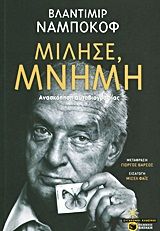Ναι, θα το πρότεινα σε φίλο-η μου
19-07-2013 21:24
Υπέρ Καθηλώνει
Κατά
Speak, Memory by Vladimir Nabokov
Chess was the reason I "discovered" Vladimir Nabokov many years ago. I know that it sounds funny, like "discovering" Montalban because of cooking, but in my case I managed both. I wonder how many amateur lepidopterists got attracted to Nabokov's work because of "Plebejus (Lysandra) cormion Nabokov", a small blue-grayish butterfly that the Russian author first discovered and described in an entomological journal in the early 40s. Not many I guess. With chess is different. Nabokov's chess compositions are known to only a selected few, chess composition being a rare pastime even amongst chess players, but his "Защита Лужина", Luzhin's Defence, is one of the most important pieces of chess fiction. Inspired by the life and death of Count Von Bardeleben, Nabokov manages to describe certain aspects of the chess psyche and those who wander around amateur chess tournaments have met many a chessplayer with behavioural similarities to Luzhin, although we don't see such things at the top level anymore.
I have in my hands the Everyman's Library Edition of Speak, Memory, Vladimir Nabokov's autobiography and I mention it because I liked this edition a lot - its paper, its binding, its b/w photos. I also liked the introduction by Brian Boyd, an experienced "Nabokovist" (having written books on Ada and Pale Fire). Nabokov's work seem to raise a certain excitement amongst scholars and therefore many of them have written studies about his novels or extensive notes included in editions around the world. A good example is an excellent Greek translation of Lolita that has 250 pages of additional notes, following the steps of Alfred Appel Jr's efforts who died 2 years ago at 75 having extensively annotated that same novel. "Speak, Memory" consists of 16 chapters - written independently and in a different order than the one they appear in the book - spanning the "European" part of Nabokov's life, from pre-revolutionary Russia, his family's runaway trip to the south to save themselves from the Bolsheviks and their imminent departure to Europe after the Whites lost the Civil War, his life in exile as a Russian Emigre, up to his second runaway journey - this time to get away from the Wehrmacht - from France to New York.
Seventy years of communist propaganda tried to convince the rest of the world that Russia went from the Middle Ages straight to Lenin and it took more than two decades and Stalin's Great Terror for the Western Intelligentsia to start questioning those certainties and discover the fact that pre-Bolshevik Russia was a relatively liberal society, especially if someone compares it with the post-1917 Soviet State. Russian emigres like Nabokov were trying to inform people in the West about this, but most of them, blinded by Lenin's buzzwords about the working class attributed this hostility to bitterness about properties lost and fortunes expropriated. Nabokov himself had great contempt for those emigres who kept whining about their lost fortunes without having any sense on what was going on politically in their country either before or after the October putsch. Nabokov's father was a prominent liberal, one of the most well-known anti-tsarists of the period. One of his childhood memories consisted of watching his father write yet another flaming article to be published in a liberal newspaper. This image of someone being free to write what he wishes against the regime was something that Nabokov would not live to see again in Russia. One could say that the 1890-1917 years were much more liberal than today's post-perestroika Putinist Russia. Of course Nabokov doesn't care about the fact that most of his countrymen were striving for food and firewood in order to survive and couldn't appreciate the political climate of the 1900s. Better to be unequal and free than "equal" in a prison-state.
Nabokov also talks about Russia's countryside, climate and most of all butterflies and moths. He chronicles this great passion of his that entertained him all throughout his life, wherever destiny threw him from the Urals to America's West Coast. He talks about his school, his friends, his first love but most of all, about his governesses and tutors - scores of them! - English, French, Poles, Jews, who accompanied him during the summer months to whichever European resort was chosen that particular year, his drawing and music tutors becoming desperate with what they saw as a talentless young boy. His genealogy also takes an important place in his memoirs, a family tree that spans impressively three centuries full of celebrities and scandal. One can easily keep on listing subjects like this, but this falls short of describing the magic of the text. It's not what he writes about, but how he writes it. Clever, dense, sometimes peculiar and eccentric, these were easily the slowest 250 pages I ever read if we exclude the tortures of the school years. And no matter how spontaneous or thoughtful, political or literary a review like this might be, it cannot beat the last chapter of the book, "On Conclusive Evidence", a pseudo-review that the author applies to himself and his own work, one of the best literary reviews I ever read, a brilliant exercise of watching one's own work from the necessary distance.
5/5 Stars
Reviewed at the social site for books and libraries http://www.librarything.com by trandism
Ήταν χρήσιμο αυτό το σχόλιο;
Ναι
/
Όχι

 Το Κοινωνικό Δίκτυο για τον Αναγνώστη και τα Βιβλία του
Το Κοινωνικό Δίκτυο για τον Αναγνώστη και τα Βιβλία του








 Κοινοποίηση
Κοινοποίηση







